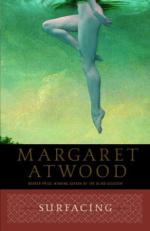
|
| Name: _________________________ | Period: ___________________ |
This test consists of 15 multiple choice questions and 5 short answer questions.
Multiple Choice Questions
1. The narrator decides it would be easy for a person who is hiding to
(a) Set traps for the searchers.
(b) Avoid those searching for him or her.
(c) Find their true self.
(d) Survive on plants and roots.
2. In the morning, the narrator and Joe discuss
(a) Who will move out of their shared apartment.
(b) The date they will set for their wedding.
(c) The narrator's desire to have a child.
(d) David and Anna's marriage.
3. In the flashback about her mother, the narrator reveals
(a) That her mother was afraid of the bear, but did not show it when she protected her children.
(b) That bears were threatening the island.
(c) That nothing can keep children safe.
(d) That her mother was too afraid to protect her children.
4. The narrator finds it difficult to enter the lake because
(a) She is afraid of drowning.
(b) She is afraid her father will appear.
(c) She can not remember how to swim.
(d) It is too cold.
5. The narrator reports that she is beginning to suspect
(a) That her father is alive.
(b) That her head and body are somehow separate.
(c) That she is somehow different from her guests.
(d) That she cannot communicate in English.
6. The narrator reflects that when she "willed" her fish to be caught, she could tell herself
(a) That she had outsmarted the fish, like her brother.
(b) That she had accomplished something all by herself.
(c) That the fish did not feel any pain.
(d) That they had chosen to die and had forgiven her in advance.
7. The description of the tourists who visit the town implies
(a) The narrator feels they are imposters.
(b) The narrator feels hatred and hostility toward them.
(c) The narrator is indifferent to their presence.
(d) The narrator appreciates their contribution to the town.
8. Instead of reading or playing bridge, the group decides to
(a) Smoke pot out by the lake.
(b) Have a bonfire.
(c) Tell each other stories about their childhoods.
(d) Hunt for the next day's breakfast.
9. When Paul sees the narrator
(a) He denies having written her.
(b) He runs to greet her.
(c) He does not recognize her.
(d) He confronts her angrily.
10. The narrator's description of the city they drive through is
(a) Bleak and depressing.
(b) Sophisticated and upscale.
(c) Dark and dangerous.
(d) Bright and cheerful.
11. The narrator decides her childhood was a good one because
(a) Anna tells her she should appreciate it.
(b) It was safe and removed from real world events.
(c) It was in Canada rather than America.
(d) There was no war or poverty during her youth.
12. The narrator believes her father
(a) Will be waiting for her when she arrives.
(b) Will be furious with her for staying away so long.
(c) Has died out on the lake.
(d) Does not want to be found.
13. The narrator and her companions are traveling in
(a) The United States.
(b) France.
(c) Canada.
(d) Mexico.
14. David slips in and out of "a yokel dialect," which implies
(a) He came from the country originally.
(b) His identity is flexible as well.
(c) He does not know they speak French in Canada.
(d) He has contempt for the town and the people.
15. The narrator is trying to decide
(a) Whether she loved her first husband.
(b) Whether she loved her parents.
(c) Whether she is falling in love with David.
(d) Whether she loves Joe.
Short Answer Questions
1. The canoe trip is difficult for the group because
2. The narrator believes her parents never took down the chicken-wire enclosure because
3. What is suggested by the fact that the narrator describes Anna as her best woman friend, though they've know each other only two months?
4. David teaches
5. David wants to stay on the island
|
This section contains 685 words (approx. 3 pages at 300 words per page) |

|




